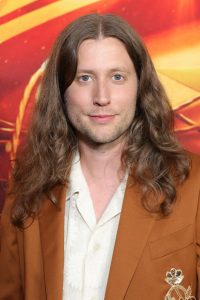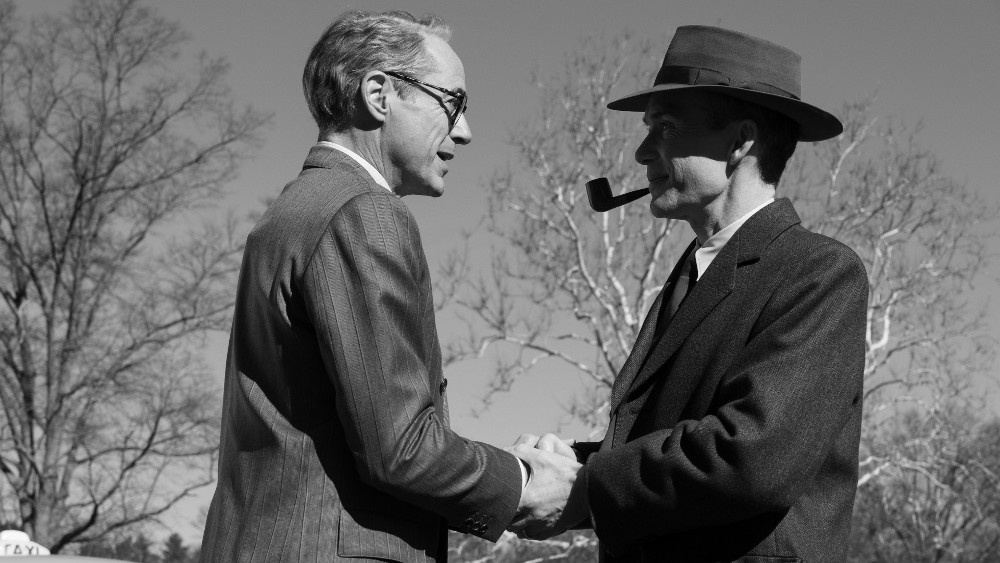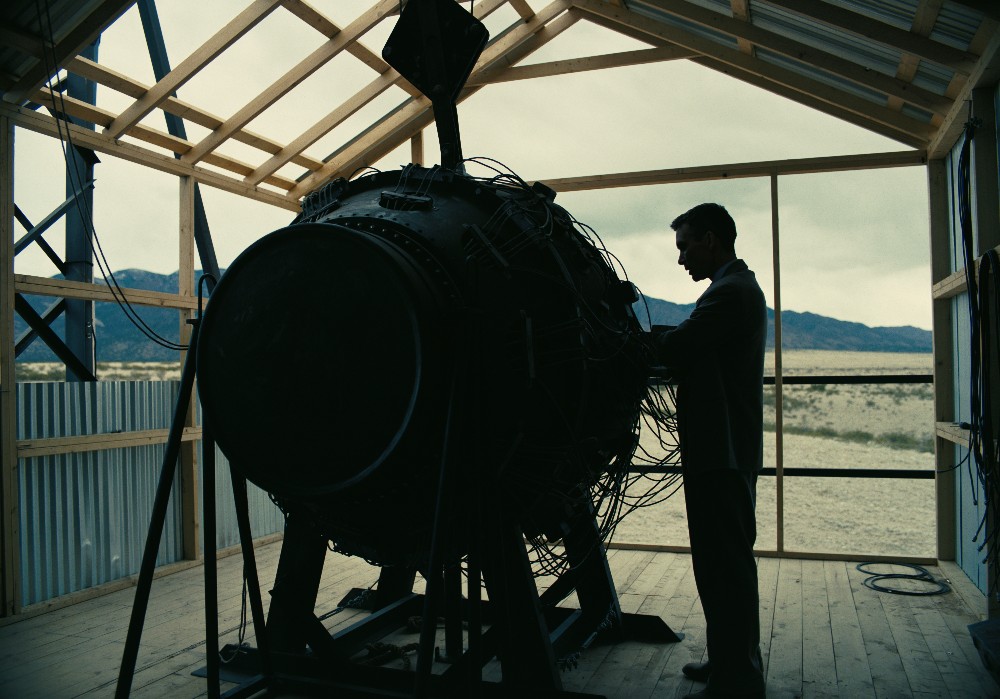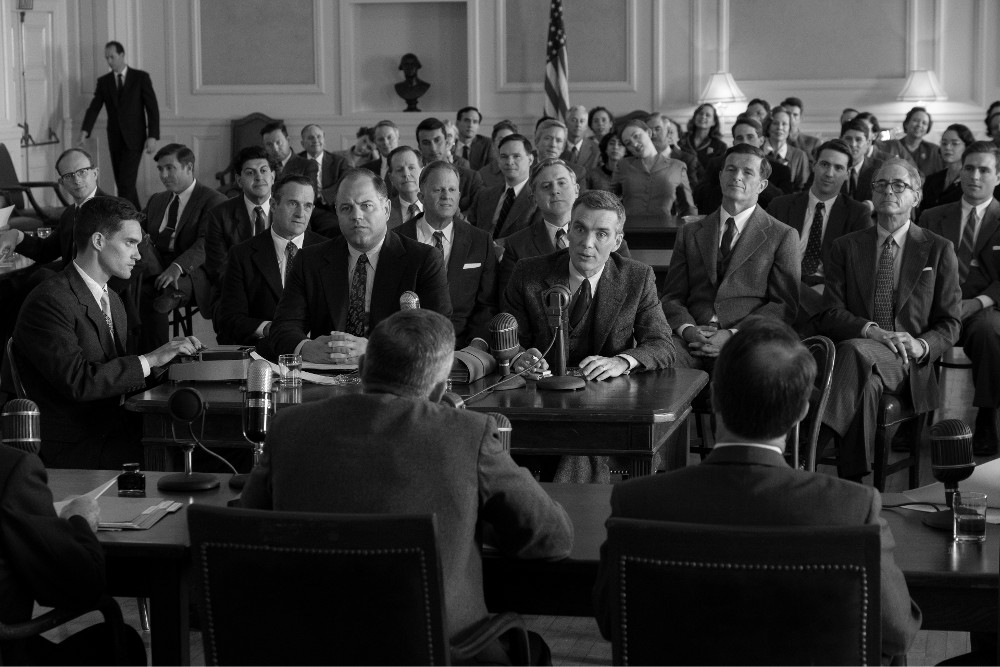
It’s been more than four years since Swedish musician, composer and producer Ludwig Göransson won the Oscar for his score for Marvel Studios’ Black Panther. Not long after that, he would be hired by filmmaker Christopher Nolan to score his science-fiction action flick, Tenet, which had the misfortune of being released mid-pandemic.
Almost three years later, he’s been reunited with Nolan for Oppenheimer, possibly one of the filmmaker’s most ambitious films to date with a score by Göransson to match. It stars Cillian Murphy as Dr. J. Robert Oppenheimer, considered to be “the father of the atomic bomb,” a complex character caught up in political intrigue as he uses his theories of quantum mechanics to create and test the first atomic bomb in Los Alamos, New Mexico in 1943. Months later, the bombs he helped create would be used on Hiroshima and Nagasaki, Japan, effectively ending World War II.
The world was forever changed.
Göransson had an astounding career from doing the music for Dan Harmon’s popular NBC show, Community, leading to his production for Childish Gambino (aka Donald Glover) for which he received his first two Grammys. Göransson would then receive his first Oscar and a third Grammy for his score for Ryan Coogler’s Black Panther, and he also won two Emmys for his music for the Disney+ “Star Wars” series, The Mandalorian.
His score for Oppenheimer plays a crucial role in the emotions and the tension building up to the first atomic bomb test in Los Alamos, but it’s also nothing like the scores Göransson has done before.

Below the Line spoke with Göransson over Zoom earlier in the week, as Nolan’s Oppenheimer began to be released for the world to see, although we didn’t get around to asking him if he has a Broadway musical in him to complete that elusive EGOT.
Below the Line: This is quite a masterwork of a score, and I was surprised this was only your second time working with Christopher Nolan. Did you first connect with him after you had won the Oscar for Black Panther?
Ludwig Göransson: Yeah, I got a phone call out of the blue that he wants to meet me. I went to his place, and we talked about film and music, and six hours later, I came home. It was a long, great meeting, and we connected right away. I think it was the day after that I got a call that he was like, “Hey, do you want to come by and read the script for my new movie called Tenet?” I don’t think he even said what the name was, but he was like, “Do you want to come read the script?”
BTL: There’s a lot of mystery behind his movies generally until they’re announced, but while you were working on Tenet, did you already know that he had this interest in Oppenheimer?
Göransson: No, we were just so focused and deep down in the trenches of Tenet. Although after we’ve wrapped Tenet, we kept in contact, we watched movies, we talked about music, but he’s very secretive of the way you work, so it wasn’t until another day out of the blue, I got a phone call, “Hey, do you want to read my new script tomorrow?” You go into the first time you read a script with no knowledge of what’s going to be in front of you, and that’s the excitement of it.
BTL: Having read the script, do you already start thinking about themes or music?
Göransson: First of all, when I sat down and read the script, I was floored and never read anything like that. You really go inside the head and the eyes of Oppenheimer. It’s written in first person, and I’ve never had that experience before. My immediate reaction to it was that the music needs to sound like you’re in the mind of Oppenheimer. He’s a genius, but he also has a lot of demons and complex feelings and things going on in that man’s head. Musically, how do you cover that whole spectrum? That was one of the challenges for me, for sure.

BTL: Do you actually do demos of music for Christopher Nolan to cut to or are you waiting for him to have some kind of edit before you’re doing any of that?
Göransson: That’s one of the great thing about my creative collaboration with Chris, is how he gets me involved so early in the process. As soon as he has a script, he gets me involved, so we have about three months from the time I read the script to [when] he starts shooting the movie.
For those three months in pre-production, that’s when the essence of the score and the sound world gets created. We have we meet up once a week. I write 10 minutes of music once a week, and then we talk about the music. We analyze and dissect it, and that’s when the core of the score gets written. When he goes off shooting, he has about two to three hours of music to bring with him.
BTL: That’s amazing, although that doesn’t necessarily mean that he ends up having three hours of music in the movie, though, right?
Göransson: It has a lot of music in it. It’s not three hours, but there’s quite a lot. When he starts shooting, he starts editing the movie, and he already has a lot of music to put into the first cut. When I sit down and watch the first cut, there’s no temp music from any other movies, all the music in there is the music that we’ve already done for the movie. So you’re in this completely brand new world.
Obviously, when he starts editing and cutting the movie, that’s the final phase of my work, and we have about three to four months when we finish everything. We write new cues, and we trim cues, and we really make everything perfect for the cut.
BTL: Are your demos right from the computer? I know you produce music, too, but what’s your main instrument?
Göransson: My main instrument is guitar, and I also write a lot on piano, but Chris had this idea early on, when we started our creative conversations, to use the violin as the lead instrument for Oppenheimer. That was one of the first notes he gave me to experiment with the violin, and my wife is an incredible violinist, Serena McKinney [Göransson]. I was able to collaborate with her in the beginning and make these demos. We were just experimenting with microtonal glissandos and vibratos.
Essentially, what I think Chris was interested in was how you can take this violin, which is a fretless instrument, and you can have the most romantic, intimate personal sound in one second, and then within a split second, you can change the tone of the vibrato to make it neurotic and horrific, so you go in between those feelings within a really short amount of time, just based on the performance was what was enticing about that.
BTL: I love the sound of the score, where it doesn’t sound like a traditional orchestral thing. It sounds like a violin, but at times, it sounds like you have ten violins playing almost in unison. I’m not sure if your wife ended up playing all of that or you still went to a recording studio with a large orchestra.
Göransson: Yes, the movie starts off with this intimate sound, but then it transcends into an opera. It goes from one violin… it’s almost like that lecture. He starts off teaching one kid, four people come in, the whole class comes in, and you feel the music growing. The dynamic spectrum of the music is it goes from that super-intimate sound to a huge 70-piece orchestra performing the score. It’s a big feat for sure.
BTL: Was there any particular sequence of the movie you were more concerned about getting right, and so you were focused on doing that first?
Göransson: One of the first things I saw after reading the script was Chris invited me to an early screening that he had at an IMAX theater to show some of the visual experiments that he and Visual Effects Supervisor Andrew Jackson had worked on together. I remember going into the darkened theater, huge screen, sitting down watching 20 minutes of visual experience of atoms swirling around, spinning around. I was kind of floored, because I’ve never experienced anything like that. I was like, “I want the music to sound like that, but I’m kind of scared because I don’t know how we were going to be able to do that with live performances and a live orchestra.”
There was that changing speed of the swirling atoms that was just so exciting to me. There’s a scene in the movie where Kenneth Branagh is telling Oppenheimer, “Can you hear the music?” And then, it goes into this montage where you see him as a student, and you see the swirling atoms. That piece of music, when you have that visual depicted in the music, the challenge was that there’s about 20 different tempo changes in that piece of music. It goes faster, faster, faster, faster. I didn’t think it was humanly possible to get a live performance out of that. I think we spent about three days with the most incredible musicians in the world, and me and my wife Serena, we figured out a new way how to record music in a continuous loop where we can give the musicians that click in their headphones, so they were able to do that all in one take.
BTL: Do you work with your wife a lot? Does she play on a lot of your scores?
Göransson: We’re always working together. She’s a big part of my creative process, but I think especially for this one, she’s featured in a way throughout the movie, and I think her sound is so special on the violin. The way it has its place in the movie, I think it’s really unique for the way we work together.

BTL: I would guess that the build-up to the Trinity test would have been an important part of the score to get right, since the music adds so much to the tension.
Göransson: Yes, it’s such a huge part of the movie. That scene is the second movement, the second act. It’s one of my favorite acts of all time. Musically, I think what was so interesting is that we have this lush orchestra, we have these beautiful melodic lines, and then all of a sudden, we go into the actual physics. The bomb is a real thing. Before that, it’s all theory, it’s all scribbles, it’s all thoughts. But then, when we actually have that device, you see them putting it together, the tone of the music completely changes, and it goes into just these three sounds.
It’s almost like sound design, but it’s a musical sound design. You have one thumping bass that is channeling the large impact of the bomb, and then you have this little metal ticking sound that’s like “tick tick tick tick,” that feels like, “Okay, we’re not going to let you go here. These scientists, they could erase human mankind in this part of the movie.” We wanted to build up the momentum from that to the very end of when you see him pressing that button, and also, the impact of the sound design and the silence that comes afterwards.
BTL: I know you produce music, but are you generally a knob-twiddler when it comes to your scores? Do you generally go in there and mess with EQs and reverbs and such?
Göransson: I do. One of the things that was different from this score was that I started out just trying to embellish the emotional core of the character. With that, I mean, I started out just writing organic music, so it’s just violins, it’s piano, it’s strings. It doesn’t have any production on it in the beginning. I knew if we got that emotional core right, to infuse the synthesizers and the modern production afterwards, that would be easier if we got the emotional tone right. Eventually, you hear these synthesizers entering the sound world. I also feel like the synthesizer is channeling the impending doom, if you want to say that.
BTL: I recently spoke with one of your peers, Daniel Pemberton, and we got into this nerdy conversation about reverbs, and he mentioned being impressed with one of the reverbs you created for the Tenet score. That’s why I wondered if you go in and model or pattern your sounds in that sense, as well.
Göransson: I think that the production aspect of writing music, especially today, is more important than ever. Since this is a period piece, I wanted the instrumentation to channel that time period, but I also wanted the music to sound the way you couldn’t have done it back then. I wanted it to be timeless, and that’s what’s so special in the way Chris works. You see it in the costume design. They’re wearing incredible clothes, and it’s from that time, but it’s also you could see people today wearing those clothes. Also, with the visual effects. It’s not CGI. With CGI, you can see that was made five years ago, but using all analog and these visuals, you can’t really put the time on it. It’s past, current or future, and that’s what I wanted to embellish with the score.

BTL: You’ve also been scoring The Mandalorian, which is on its fourth or fifth season now, but it’s been going on for some time, so are you doing that while also scoring these films? How do you balance that?
Göransson: No, I’m at the time now in my career where I really like to focus on one thing at a time, especially when you do these movies that really demands a lot of attention. These movies and projects that really feel like they mean something to you, you want to put all of yourself into that project, and I feel like you get something in return as well. So I only work on one thing at a time.
BTL: You’re also a record producer, so is that something that’s a large part of your life, or has scoring taken over a bit more from that?
Göransson: No, the record producing aspect of me is also part of my life, and just how the business works right now is when you have a movie project, you can book that a year in advance, and you know I’m going to put nine months of my life on this project. With the recording business, it’s a little bit different how it’s built up right now in the world. An artist can call you and it’s like, “Hey, next week or two weeks from now, I need to go into the studio. Can we do two days or three days here?” It’s a little bit different in how I schedule my time, but I love recording albums and songs.
BTL: I know that early in your career you did music for Community and then you ended up producing the first Childish Gambino record with Donald Glover, but did you work with the Russo Brothers a lot on that show, or were you mainly working with Dan Harmon? I was surprised that you haven’t worked with them since their movie stuff have taken off.
Göransson: No, I mean, it was both, especially the first two or three seasons on Community, there was me, Dan Harmon and the Russo Brothers in the edit room once a week, so I spent a lot of time with them. I also went on to do a couple of other shows with them on TV, and then obviously, they’re busy now doing all kinds of incredible movies and stuff. We’re still close, and I love those guys.
BTL: My last question is about how COVID affected Tenet, because I wasn’t sure if you actually had finished the score on that when COVID hit, and are things back to normal somewhat?
Göransson: Unfortunately, the last couple of months on Tenet were affected by COVID, mostly when the movie came out. I think it was probably the only [major] movie that came out that year in the theaters. Right now, I feel like it’s more or less back to normal, at least for me and how my process works and how everything was recorded in the last 12 to 15 months, I would say.
Oppenheimer hits theaters on Friday, July 21 with previews on Thursday night.





